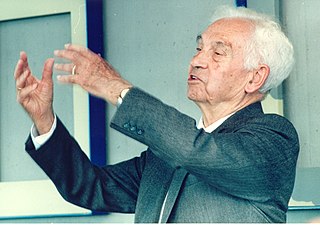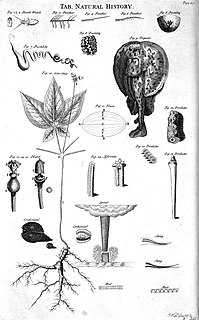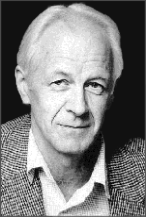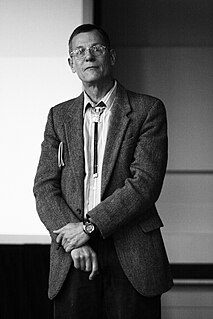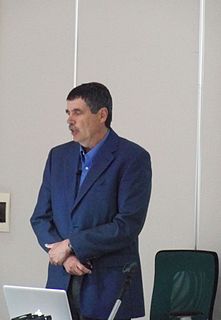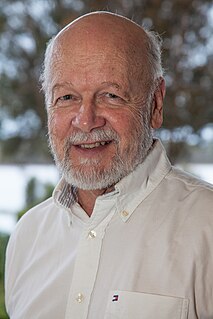Harry W. Greene (born September 26, 1945) is an American herpetologist, currently working as a professor of ecology and evolutionary biology at Cornell University.

Ecology is the branch of biology which studies the interactions among organisms and their environment. Objects of study include interactions of organisms that include biotic and abiotic components of their environment. Topics of interest include the biodiversity, distribution, biomass, and populations of organisms, as well as cooperation and competition within and between species. Ecosystems are dynamically interacting systems of organisms, the communities they make up, and the non-living components of their environment. Ecosystem processes, such as primary production, pedogenesis, nutrient cycling, and niche construction, regulate the flux of energy and matter through an environment. These processes are sustained by organisms with specific life history traits. Biodiversity means the varieties of species, genes, and ecosystems, enhances certain ecosystem services.

Evolutionary biology is the subfield of biology that studies the evolutionary processes that produced the diversity of life on Earth, starting from a single common ancestor. These processes include natural selection, common descent, and speciation.

Cornell University is a private and statutory Ivy League research university in Ithaca, New York. Founded in 1865 by Ezra Cornell and Andrew Dickson White, the university was intended to teach and make contributions in all fields of knowledge—from the classics to the sciences, and from the theoretical to the applied. These ideals, unconventional for the time, are captured in Cornell's founding principle, a popular 1868 Ezra Cornell quotation: "I would found an institution where any person can find instruction in any study."
Greene achieved a B.S. in Biology at Texas Wesleyan University in 1968, an M.A. in Biology from the University of Texas at Arlington in 1973, and a PhD in Zoology from the University of Tennessee in 1977. He worked as a US Army medic in Germany in 1968-1971.
Texas Wesleyan University is a private, coeducational, liberal arts university founded by the Methodist Episcopal Church, South, in 1890. The main campus is located in the Polytechnic Heights Neighborhood of Fort Worth, Texas, United States. Its mascot is the ram.

The University of Texas at Arlington is a public research university located in Arlington, Texas, midway between Dallas and Fort Worth. The spring 2017 campus enrollment consisted of 41,933 students making it the largest university in North Texas and fourth largest in Texas. UT Arlington is the third largest producer of college graduates in Texas and offers over 180 baccalaureate, masters, and doctoral degree programs.

The University of Tennessee is a public research university in Knoxville, Tennessee. Founded in 1794, two years before Tennessee became the 16th state, it is the flagship campus of the University of Tennessee system, with ten undergraduate colleges and eleven graduate colleges. It hosts almost 28,000 students from all 50 states and more than 100 foreign countries. In its 2019 universities ranking, U.S. News & World Report ranked UT 115th among all national universities and 52nd among public institutions of higher learning. Seven alumni have been selected as Rhodes Scholars. James M. Buchanan, M.S. '41, received the 1986 Nobel Prize in Economics. UT's ties to nearby Oak Ridge National Laboratory, established under UT President Andrew Holt and continued under the UT–Battelle partnership, allow for considerable research opportunities for faculty and students.
Greene has made numerous scientific publications (about 150 by 2005) and conducted field work in the United States, Europe, Mexico, Central America, South America, Africa and Vietnam. His main areas of research are evolutionary biology, behavioral and community ecology, vertebrate conservation, and feeding and defense in lizards and snakes. He was a researcher for one episode of the 2008 BBC series Life in Cold Blood .
The British Broadcasting Corporation (BBC) is a British public service broadcaster. Its headquarters are at Broadcasting House in Westminster, London, and it is the world's oldest national broadcasting organisation and the largest broadcaster in the world by number of employees. It employs over 20,950 staff in total, 16,672 of whom are in public sector broadcasting. The total number of staff is 35,402 when part-time, flexible, and fixed-contract staff are included.

Life in Cold Blood is a BBC nature documentary series written and presented by David Attenborough, first broadcast in the United Kingdom from 4 February 2008 on BBC One.
Greene is the Stephen Weiss Presidential Fellow and Professor of Ecology and Evolutionary Biology at Cornell University and the recipient of the E. O. Wilson Award from the American Society of Naturalists. His book Snakes: The Evolution of Mystery in Nature (UC Press), won the PEN Literary Award and was a New York Times Notable Book.

Edward Osborne Wilson, usually cited as E. O. Wilson, is an American biologist, theorist, naturalist and author. His biological specialty is myrmecology, the study of ants, on which he has been called the world's leading expert.
The American Society of Naturalists was founded in 1883 and is one of the oldest professional societies dedicated to the biological sciences in North America. The purpose of the Society is "to advance and diffuse knowledge of organic evolution and other broad biological principles so as to enhance the conceptual unification of the biological sciences."

